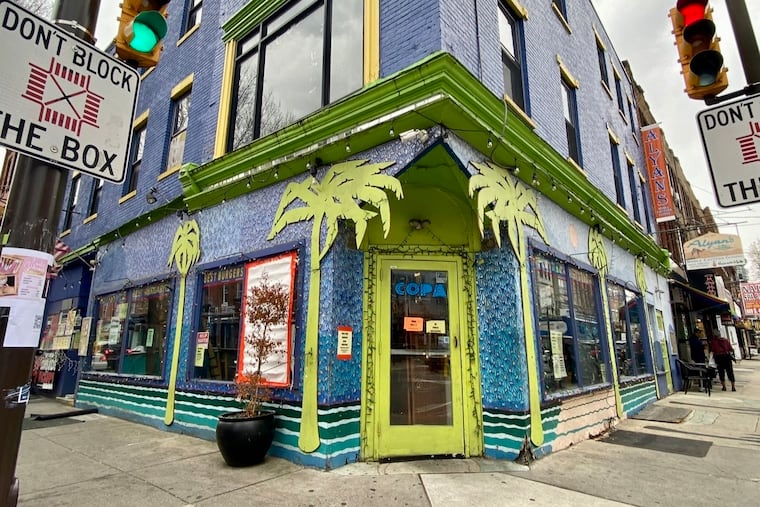Unable to pay its rent, South Street’s Copabanana files for bankruptcy
The South Street fixture has struggled to recover following the pandemic and from other factors, like a nearby fire.

In January, Copabanana, the iconic burger and margarita restaurant that has stood at Fourth and South Street for 45 years, started a GoFundMe campaign to help pay its bills. The long-standing eatery, with its funky green and blue palm tree facade, was buried in debt — the latest in a series of financial problems.
“Copa needs help,” wrote co-owner Nick Ventura in a lengthy plea for donations.
He laid blame for the restaurant’s struggles on the pandemic, the unrest that followed the murder of George Floyd, and the 2022 mass shooting nearby. He said the restaurant needed help with everything from past-due rent, mortgage and loan payments to growing medical expenses for Copabanana’s ailing founder, Bill Curry, who is confined to his home.
Despite the emotional plea, the restaurant fell far short of its $250,000 goal, raising only $165.
Now, in a final effort to avoid eviction, Copabanana, one of the few South Street businesses that can trace its roots to the street’s bohemian renaissance, has filed for Chapter 11 bankruptcy protection. It is the third time that the restaurant has filed bankruptcy in the last decade.
“It was the only way to rescue the business,” Ventura said Thursday of the May 26 petition filed with the U.S. Bankruptcy Court for the Eastern District of Pennsylvania. “We’re not trying to screw anybody. We’re not trying to hurt anybody. It was the way to go forward and get the breathing room that we need.”
Financial issues have long plagued Copabanana (which is not affiliated with the restaurant in University City with the same name).
In 2016, Daniel Christensen, a previous Copabanana partner and former chairman of the South Street District, pleaded guilty to fraud. He had used $1.4 million meant to promote the district to pay bills at Copabanana. He repaid the money, and died before sentencing.
In the latest filing, first reported by the Philadelphia Business Journal, the 344 South Street Corp. — the entity that owns the restaurant — lists Copabanana’s total assets at under $50,000. (Ventura is majority owner, while Curry owns 40%, and Joseph Cucolo owns 10%.) The court record does not reflect exactly how much the restaurant owes, or to whom. Ventura estimates that the company owes between 10 and 15 creditors. Most, he said, is owed to the restaurant’s New York-based landlord, which owns three of the five properties that Copabanana leases on the block.
The restaurant, which remains open, had become unable to pay its $36,000 in monthly rent, Ventura said.
“Copa is a big space,” he said. “One landlord became much more aggressive and that’s what brought us to the table.”
The landlord — listed in records as a limited liability corporation — could not be reached for comment. Ventura said he could not discuss whether the restaurant would seek to move.
Copabanana’s previous bankruptcies were filed in 2015 and 2019. Both cases are now closed, according to court records. Those cases dealt with taxes owed to the city and the IRS.
Copabanana’s recent woes stem from a series of blows, Ventura said.
The restaurant did not receive federal COVID-19 economic relief, Ventura said, although he estimates that Copabanana qualified for nearly $2 million. It could not afford to repair two windows broken during the social unrest that spilled onto South Street after Floyd’s murder. The windows remain boarded. The mass shooting last June, leaving three people killed and 11 injured, “devastated” business at the Copabanana, Ventura said. After the shooting, which reignited conversations on how to best balance public safety on the corridor, sales plummeted by 70% and never recovered, Ventura said.
“First, we had COVID-19 and we had no money to pay any of our bills,” he said. “Then we had all the unrest on South Street. It all culminated with the shooting. Nobody wanted to come to South Street.”
The July fire that shuttered Jim’s Steaks across the street hurt the crowds more, Ventura added.
Still, Copabanana has persisted through decades of change on South Street.
Curry, who is 82 and has been ailing for five years, was the king of South Street four decades ago. First, he ran a quirky newsstand near Fourth and South called Paper Moon that served as a cultural hub for the artists and hippies transforming the then-near-deserted corridor. As nightlife columnist for The Inquirer, he championed the changing street in print. Before he opened it in 1978, Copabanana was a bar called Turks, where revelers pushed on a phone-booth wall and climbed a hidden staircase into a Prohibition-era speakeasy.
“He turned a speakeasy into a dining room,” said Joel Spivak, an architect, activist, and South Street historian. “Our corner hangout became the Copa.”
With its funky facade, margaritas, burgers, “Spanish” fries, and owner who doubled as South Street’s most vocal cheerleader, Copa became a hit.
It spawned Copa, Too!, a takeout shop next door, and later, Hurricane Alley. In 1981, a few doors away (next to what is now the TLA), Curry and a partner opened the upscale Cafe Nola.
In recent weeks, as crowds have flowed back onto South Street for its annual spring street festival, and word has spread about Copabanana’s financial straits, old customers have returned to show support, Ventura said.
“Lots of people are coming out of the woodwork and showing love to the Copa,” he said.
He remains optimistic.
“The Copa will live on,” he said. “It will survive.”
Staff Writer Ryan Briggs contributed to this article.